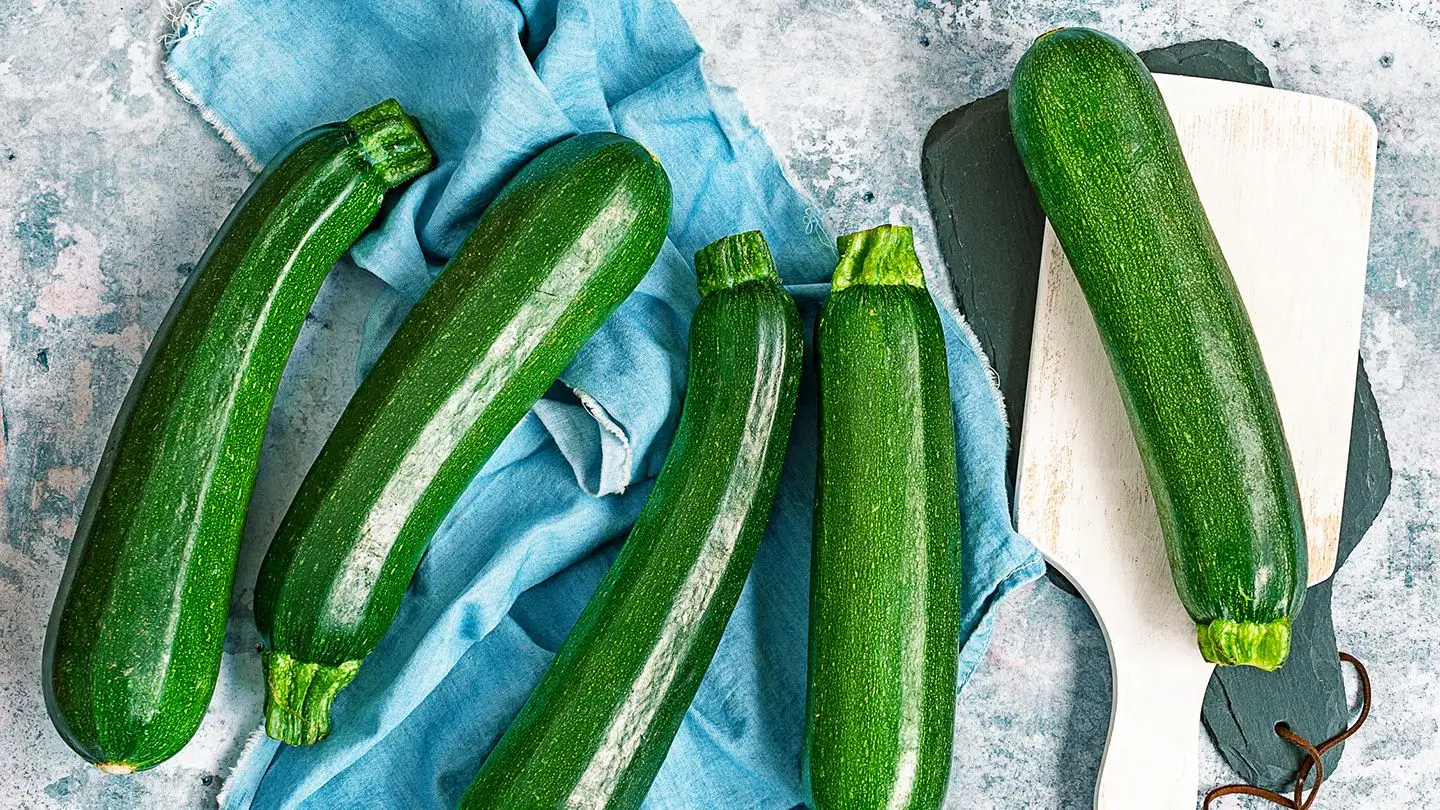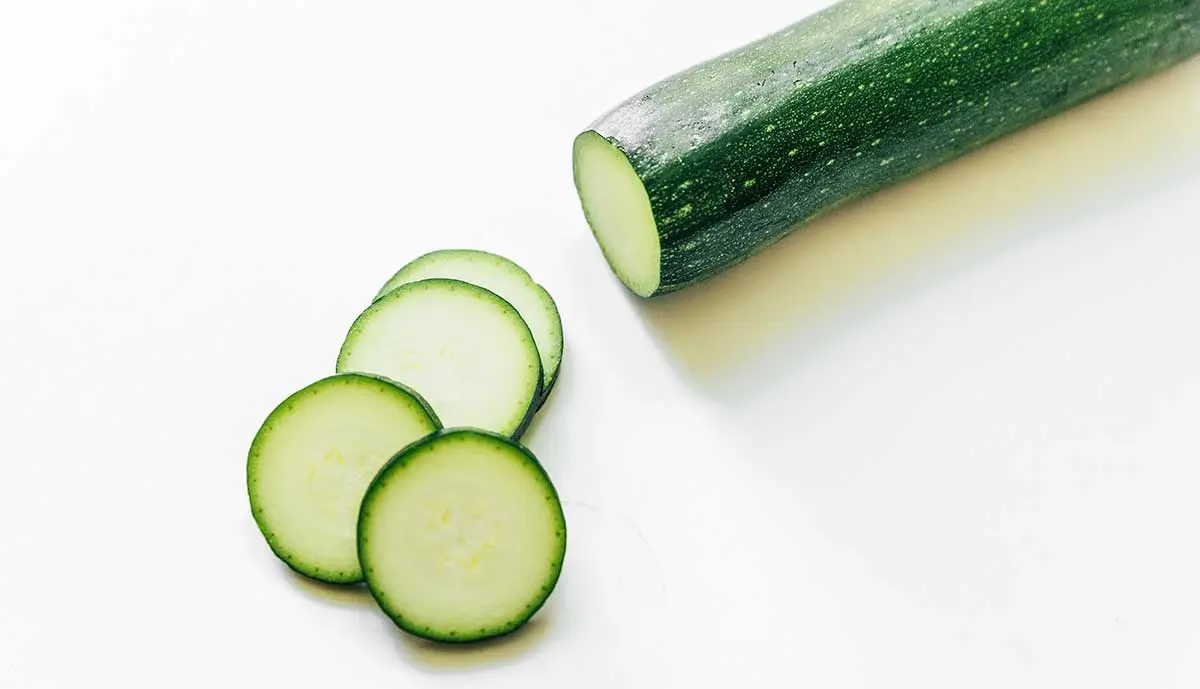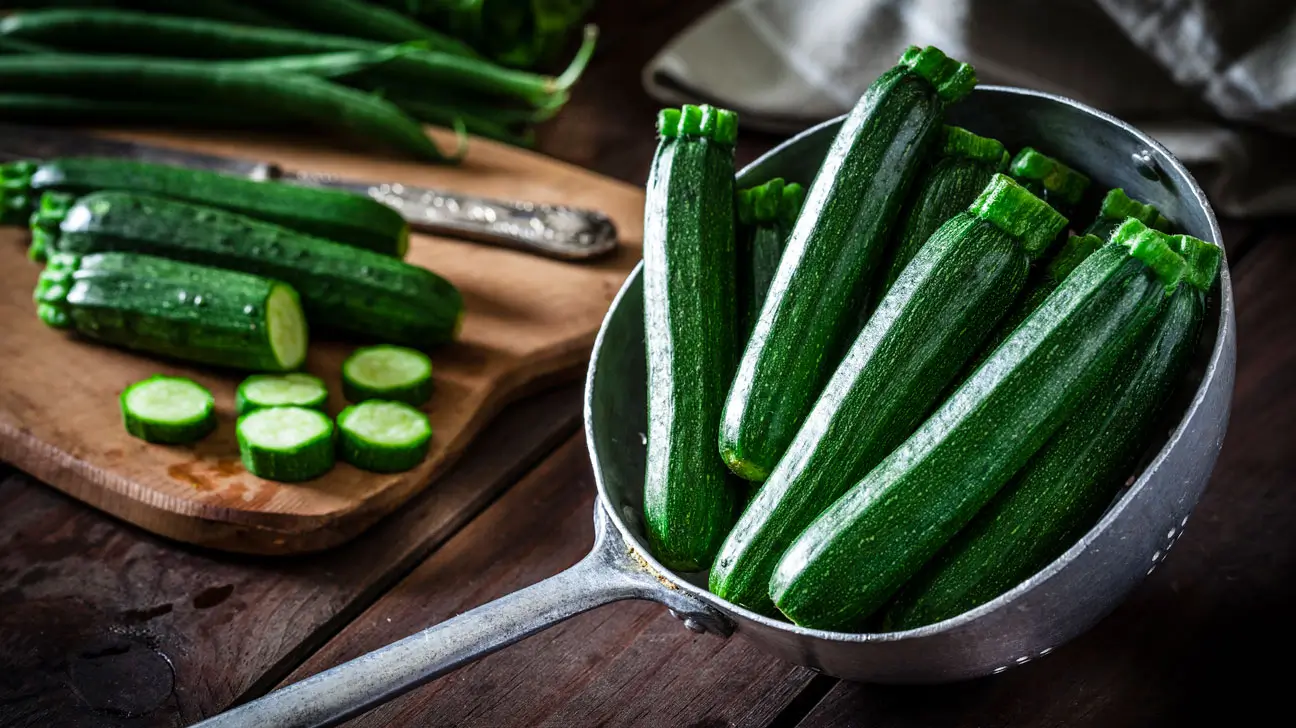You have probably seen that green summer squash vegetable in your local grocery store, zucchini. But if you are concerned with the health effects of this vegetable, you might be wondering whether to eat it. Let’s talk about it.
But is zucchini good for you? The short answer is yes! This healthy vegetable packs a powerful nutritional punch and offers many health benefits.
Let’s explore the benefits, side effects, and nutritional facts of zucchini compared to other vegetables to discover why it is good for our health.
What is Zucchini?
Before exploring the benefits and side effects, let’s clear up this common myth: is zucchini a fruit?
Technically, it is a fruit because it belongs to a flowering plant and contains seeds. But, in culinary terms, we can say it is a vegetable.
Zucchini belongs to the Cucurbitaceae family, which includes cucumbers, melons, and pumpkins. It has become my favorite veggie in most meals because it is high in nutrients and low in calories.
Nutritional Profile of Zucchini
To understand why zucchini is good for you, let’s look at its nutritional content. Here’s a breakdown of the nutrients in one medium raw zucchini (about 196 grams):
- Calories: 33
- Carbs: 6 grams
- Fiber: 2 grams
- Protein: 2 grams
- Fat: 0.6 grams
- Vitamin C: 35% of the Daily Value (DV)
- Vitamin B6: 14% of the DV
- Potassium: 13% of the DV
- Manganese: 16% of the DV
- Vitamin K: 9% of the DV
As you can see, zucchini is low in calories but rich in essential vitamins and minerals. This makes it an excellent choice for those looking to maintain a healthy diet. It is one of the best keto diet foods.
10 Health Benefits of Zucchini
Now that we know what’s in zucchini, let me tell you its major benefits for health.

1. Supports Weight Loss
Is zucchini good for weight loss? Absolutely!
Its low calorie and high fiber content make it an excellent food for weight management.
One cup of cooked zucchini contains only about 20 calories, making it a great low-calorie alternative to higher-calorie foods.
The fiber in zucchini helps you feel full longer, reducing the likelihood of overeating. This can be particularly helpful if you’re trying to lose weight or maintain a healthy weight.
2. Improves Digestive Health
Zucchini is rich in both soluble and insoluble fiber, which are essential for good digestive health.
The insoluble fiber helps food move through your digestive tract more easily, reducing constipation. The soluble fiber feeds the beneficial bacteria in your gut, promoting a healthy microbiome.
3. Supports Heart Health
The fiber, potassium, and antioxidants in zucchini all contribute to heart health. Fiber helps lower cholesterol levels, while potassium helps regulate blood pressure.
The antioxidants in zucchini, including vitamin C and beta-carotene, help protect your heart by reducing inflammation and oxidative stress.
4. May Help Manage Diabetes
Is zucchini good for diabetics? Research suggests it can be beneficial.
Zucchini has a low glycemic index, meaning it doesn’t cause rapid spikes in blood sugar levels.
Its high fiber content also helps slow the absorption of sugar in the bloodstream, which can help manage diabetes.
5. Boosts Eye Health
Zucchini contains high levels of antioxidants like lutein and zeaxanthin, which are essential for eye health.

These compounds help protect your eyes from age-related diseases like cataracts and macular degeneration.
6. Supports Healthy Skin
When it comes to zucchini benefits for skin, this veggie doesn’t disappoint. Its high vitamin C content helps your body produce collagen, a protein essential for healthy skin.
The antioxidants in zucchini also help protect your skin from damage caused by sun exposure and aging.
7. May Have Anti-Cancer Properties
Some studies suggest that the compounds in zucchini, particularly cucurbitacins, may have anti-cancer properties.
While more research is needed, including zucchini in your diet could potentially help reduce your risk of certain types of cancer.
8. Supports Bone Health
Zucchini is a good source of vitamin K, which is essential for bone health. Vitamin K helps your body absorb calcium and reduce urinary excretion of calcium, both of which contribute to stronger bones.
9. Boosts Energy Levels
The B vitamins in zucchini, particularly vitamin B6, play a crucial role in energy production. Including zucchini in your diet can help maintain steady energy levels throughout the day.
10. Promotes Healthy Pregnancy
For expecting mothers, zucchini can be a great addition to their diet. It’s rich in folate, a B vitamin that’s crucial for fetal development. Sufficient folate intake can help prevent birth defects and support the healthy growth of the baby.

Zucchini Benefits for Different Groups
Zucchini Benefits for Women
Women can particularly benefit from zucchini’s high folate content, which is essential during pregnancy. The vegetable’s fiber content can also help manage weight and support digestive health, which are common concerns for many women.
Zucchini Benefits for Men
Men can benefit from zucchini’s potential to support prostate health. Some studies suggest that the antioxidants in zucchini may help reduce the risk of benign prostatic hyperplasia (BPH), a common condition in older men.
Zucchini Benefits for Kids
Zucchini can be a great way to sneak more vegetables into your kids’ diet. Its mild flavor makes it easy to incorporate into various dishes. The vegetable’s vitamin C content supports a healthy immune system, while its fiber promotes good digestive health in children.
An Instagram influencer shared a delicious Zucchini Pesto Pasta recipe for kids (after a few months of recipe testing):
View this post on Instagram
How to Include Zucchini in Your Diet
Now that we’ve answered the question “Is zucchini good for you?” with a resounding yes, you might be wondering how to incorporate more of it into your diet. Here are some ideas:
- Spiralize it to make zucchini noodles (zoodles) as a low-carb pasta alternative
- Grill sliced zucchini as a side dish
- Add grated zucchini to baked goods for extra moisture and nutrients
- Use zucchini slices as a healthy alternative to chips for dips
- Stuff whole zucchini with your favorite ingredients for a hearty meal
Is Cooked Zucchini Good for You?
Many people wonder if cooking zucchini affects its nutritional value. The good news is that cooked zucchini is still very good for you. While some water-soluble vitamins like vitamin C may be reduced during cooking, other nutrients increase when zucchini is cooked.
Here’s a quick look at the cooked zucchini nutrition data per cup (180g):
- Calories: 27
- Carbs: 5g
- Fiber: 2g
- Protein: 2g
- Fat: 0.4g
As you can see, cooked zucchini retains most of its nutrients and remains low in calories.
Potential Side Effects of Zucchini
While zucchini is generally safe and beneficial, there are a few potential zucchini side effects to be aware of:
- Digestive Issues: Some people may experience bloating or gas when they first increase their fiber intake by eating more zucchini.
- Allergies: Although rare, some people may be allergic to zucchini, especially if they’re allergic to other foods in the Cucurbitaceae family.
- Bitter Taste: Occasionally, zucchini can develop a bitter taste due to high levels of cucurbitacins. If your zucchini tastes bitter, it’s best to discard it as it may cause stomach upset.
- Medication Interactions: Zucchini is high in vitamin K, which can interact with blood-thinning medications. If you’re on such medications, consult with your doctor about your zucchini intake.
Comparing Zucchini to Other Vegetables
To put zucchini’s nutritional value into perspective, let’s compare it to some other common vegetables:
| Vegetable (1 cup raw) | Calories | Fiber | Vitamin C | Potassium |
| Zucchini | 21 | 1g | 24mg | 325mg |
| Cucumber | 16 | 0.5g | 4mg | 152mg |
| Carrot | 52 | 3g | 6mg | 410mg |
| Broccoli | 31 | 2g | 81mg | 288mg |
As you can see, zucchini holds its own against other nutritious vegetables, offering a good balance of nutrients with very few calories.
Summary
After finding out the major health benefits, nutritional advantages, and some minor side effects of zucchini, we can clearly say that it is generally good for us.
It offers so many health benefits from supporting weight loss and heart health to potentially fighting cancer and promoting healthy skin.
You can try it raw, cooked, or spiralized into noodles. Adding more zucchini to your diet can be a simple and delicious way to boost your nutrient intake and support overall health.
So, next time whenever you go to the grocery store, pick up some zucchinis and incorporate them into your daily meals with moderation.
As zucchini is nutritious, it’s important to eat it in moderation with other different fruits and vegetables to make sure that your body is getting all the needed nutrients.
And of course, if you have any kind of health concerns, it’s better to consult your healthcare professional or a registered dietitian for personalized advice.

